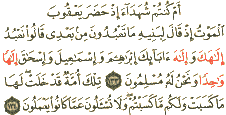|
133.
" nay, were you witnesses when death approached jacob ?
when
he said to his sons:
` what
will you worship after me ? ' they said:
` we
will worship your god and the god of your forefathers abraham,
ismail
and isaac, the one (true) god (alone) and to him we do submit '."
134.
" that is a nation that has passed away;
theirs
is that which they have earned, and yours is what you have earned;
you
shall not be questioned for what they had been doing."
occasion of revelation
a group
of the jews believed that when jacob (a.s) was on his
deathbed,
he enjoined on his children the same religion which the jews
currently
believe in (with all its corruption of the scriptures). for the
nullification
of their belief, allah sent down this verse. 1
commentary :
everyone
is responsible for his own deeds
as it is also understood from
the apparent meaning of the verse,
there were some rejectors of
islam who falsely charged jacob (a.s.), the
prophet of allah, regarding
this matter. (the matter was mentioned
in the description of the occasion
of revelation.)
to reject this false claim,
the qur'an says:
" nay, were you witnesses
when death approached jacob ?...":
were you there when he frankly
questioned his children the way he did?
yes, that which you (jews) charge
jacob (a.s.) with is not true.
the factual account which occurred
was that:
"...when he said to his sons:`
what will you worship after me ? '.."
"...they said: ` we will
worship your god and the god of your forefathers
abraham, ismail and isaac,
the one (true) god (alone)
and to him we do submit'."
yes, he did not enjoined them
with anything but to believe in
monotheism and to submit to
the command of allah, which is the root
of submission to all the divine ordinaces.
it can be deduced from this
verse that verse that when jacob was on his
deathbed, a feeling of anxiety
and worry existed in him about the future
of his children. finally he
expressed his anxiety and asked his sons what
they would worship after him.
he especially asked ` what (thing) ' and
he did not ask ` whom ', because
there were some idol-worshippers in
the locale who used to prostrate
before some particular ` things '. jacob
wanted to know whether there
was any tendency towards those beliefs
in the depths of their hearts.
but when he heard his children's answer,
he found, again, his peace of
mind.
this is also noteworthy that
ismail (a.s.) was not jacob's father or
forefather, but he was jacob's
uncle, whereas in the verse under
discussion, the term / 'aba'
/ which is the plural of the word / 'ab /
(father) has been applied. this
makes it clear that, in the arabic
language, this word was sometimes
used for ` uncle '. hence, we say
that if this word has been used
regarding 'azar in the qur'an, it does
not negate the fact that 'azar
was abraham's uncle, not his father.
* * * *
the last of the above verses mentioned
is an answer to one of the
delusions of the jews. they
emphasized very much on their ancestors
and the honour and glory they
ascribed themselves in relation to
allah. they imagined that even
when they tainted themselves with sin,
they could be rescued under
the comforting shade of such ancestors.
then, the qur'an says:
" that is a nation that has
passed away;
theirs is that which they
have earned,and yours is what you have earned;..."
and, in the same way that they
are not responsible for your deeds,
also,
"... you shall not be questioned
for what they had been doing."
therefore, instead of expending
all your energy trying to prove
that you, by right of ancestry,
deserve the honour and high position that
your pure ancestors enjoyed,
you should try to improve your own faith
and deeds.
the addressees in this verse
are apparently the jews and ` the
people of the book ', but it
is evident that this statement is not
specifically referring to them
alone, in that this basic principle, pertains
to us muslims, too.
-
1 tafsir-i-abulfutuh-razi,vol.
1, p.339
|
